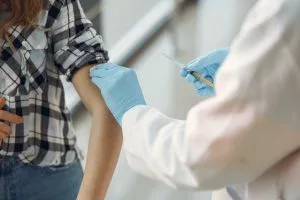
Gardasil, the leading vaccine against human papillomavirus (HPV) first introduced by Merck & Co. in 2006, has recently come under fire as a growing number of lawsuits are filed against Merck. The lawsuits name numerous medical diagnoses allegedly following vaccination with Gardasil and claim Merck fraudulent concealed the potential health risks linked to the vaccine. Specifically, the Gardasil lawsuits have been filed against Merck for issues such as failure to warn, negligence, and manufacturing defects.
Gardasil was introduced after a six-month fast-track, a process determined by FDA approval for drugs that it determines “fulfill an unmet medical need.” This is not a problem in and of itself, and there are many instances of a fast-tracked release helping many people. The development of a Covid-19 vaccine within a year of the pandemic owes itself to this process.
Gardasil Health Risks
HPV is the leading cause of cervical cancer in women. Preventing cervical cancer is the “unmet medical need” Merck used to fast-track Gardasil, and the centerpiece of all its advertising around the drug. In the new lawsuits against Merck, the women claim that none of the advertising about Gardasil included any mention of its serious health risks.
Many autoimmune disorders and complications have been noted in patients following vaccination with Gardasil. Some of these disorders include:
In fact, according to the Vaccine Adverse Effect Reporting System (VAERS), between 2006-2012, out of the 2,157 serious adverse reactions to all vaccines reported by women and girls between the ages of 6 and 29 (the primary demographic targeted in Merck’s advertising campaign for Gardasil), 1,313 of the adverse reactions were for Gardasil alone. In other words, Gardasil accounted for over 60% of serious adverse reactions to vaccines for women between the ages of 6 and 29 during those years. When you include the years between 2012 and 2017, the number of serious adverse events reported after Gardasil vaccination increases to 4341.
Gardasil Testing Failures
The process of fast-tracking vaccinations is ripe for manipulation. Pharmaceutical companies like Merck & Co. are run for profit and allowed to fund research studies determining the safety and efficacy of their own products. One of the principal research studies into Gardasil, named the FUTURE II trial, lists the conducting doctors’ potential conflicts of interest: 10 doctors were current or former employees of Merck with active equity interest or stock options at the time of the study. 18 more received consulting fees or served on paid advisory boards for Merck. At the end of a long, 275-word paragraph, documenting Merck’s fingerprints across the entire study, comes the final line: “No other potential conflict of interest relevant to this article was reported.” Dozens of conflicts of interest between doctors and Merck during a study meant to test the safety of Merck’s own vaccine is more than enough.
Predictably, there are other problems present in these same Gardasil tests. One study tested Gardasil against a control group that took an aluminum placebo. According to Gardasil’s own packaging, the control group experienced 218 diagnoses of autoimmune disorders after enrollment in the study, while the Gardasil group experienced 245. This data was used to demonstrate a statistically insignificant difference between the two groups in the study. However, aluminum has also been demonstrated to cause autoimmune disorders. The study claimed that because the numbers of autoimmune disorder diagnoses following treatment with Gardasil were so near those in the placebo group, they were the same as could be expected in the general population. However, if the placebo also poses health risks, particularly the same risks potentially caused by the vaccine itself, the entire study is faulty. That Merck instead presented these results as proof of Gardasil’s safety is dangerous.
Merck’s Track Record
This is not the first time Merck & Co. has found itself in legal trouble. In 2004, its drug Vioxx was pulled from the market. Merck marketed Vioxx for years as an aid for rheumatoid arthritis, despite no clearance from the FDA to market it as such. Further, multiple civil claims stated that Merck made false statements about Vioxx’s cardiovascular safety to doctors, patients, and Medicaid agencies. Like their misinformation surrounding Gardasil, all these claims were fraudulent. In the settlement for Vioxx, Merck was made to pay $950 million in fines.
This was not before an estimated 88,000-140,000 cases of serious coronary heart disease were linked to Vioxx, including thousands of deaths.
The current lawsuits against Merck and its Gardasil vaccine are not only about the serious health effects following vaccination, including deaths. They are about Merck’s willfully misleading research and advertising. Everyone has a right to know the risks they are taking with any medication, and to make their decision with fully informed consent. Instead, Merck & Co.’s deceptive presentation of Gardasil led to numerous serious health consequences for patients, according to the lawsuits– just as it had for Vioxx.
Contact the Gardasil Attorneys at The Collins Law Firm for Help
If you have experienced serious health complications related to a Gardasil vaccination that you believed to be safe, you may qualify for a lawsuit. Contact our experienced defective drug lawyers at The Collins Law Firm. We can help you get justice and hold Merck & Co. accountable for their behavior. Contact us at (630) 527-1595 or fill out our contact form for a free consultation to get answers to your questions and discuss your legal options.
